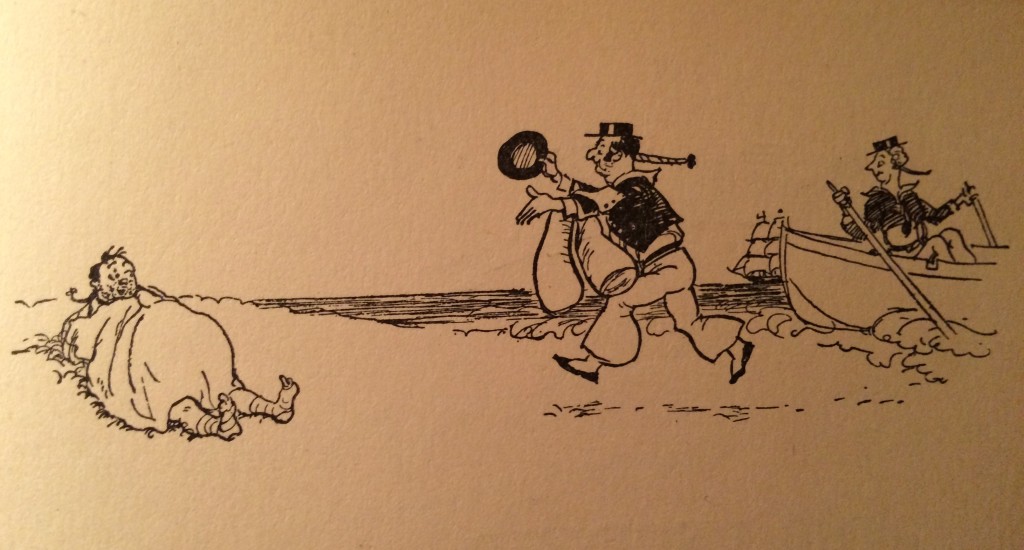I have been having illuminating conversations with a good friend who has long experienced the ups and downs of severe Attention Deficit Disorder (ADD). I can’t do justice to all that she says about the condition, but she points out that in many ways the United States is an ADD culture, throwing a daunting range of stimuli, activities, and options at us. ADD can’t entirely be seen as a negative condition, my friends says, because it can lead to immense creativity and achievement. But some become so overwhelmed that their circuits fry and they shut down, experiencing something akin to PTSD. Of the three characteristic responses of those with ADD—fight, flight, or freeze—my friend experienced a 25-year freeze from which she’s only beginning to emerge.
I observed that I was put in mind of A. A. Milne’s “Old Sailor.” When I read it aloud to her, she said that Milne for the most part captures the ADD mind very well, both its creativity and its sense of being overwhelmed. Milne’s one mistake is his unsympathetic description of the sailor as “basking.” We should rather see the him as so under attack from his overactive mind that he must shut down and wrap himself in a shawl to protect himself.
The Old Sailor
By A.A. Milne
There was once an old sailor my grandfather knew
Who had so many things which he wanted to do
That, whenever he thought it was time to begin,
He couldn’t because of the state he was in.
He was shipwrecked, and lived on a island for weeks,
And he wanted a hat, and he wanted some breeks;
And he wanted some nets, or a line and some hooks
For the turtles and things which you read of in books.
And, thinking of this, he remembered a thing
Which he wanted (for water) and that was a spring;
And he thought that to talk to he’d look for, and keep
(If he found it) a goat, or some chickens and sheep.
Then, because of the weather, he wanted a hut
With a door (to come in by) which opened and shut
(With a jerk, which was useful if snakes were about),
And a very strong lock to keep savages out.
He began on the fish-hooks, and when he’d begun
He decided he couldn’t because of the sun.
So he knew what he ought to begin with, and that
Was to find, or to make, a large sun-stopping hat.
He was making the hat with some leaves from a tree,
When he thought, “I’m as hot as a body can be,
And I’ve nothing to take for my terrible thirst;
So I’ll look for a spring, and I’ll look for it first.”
Then he thought as he started, “Oh, dear and oh, dear!
I’ll be lonely tomorrow with nobody here!”
So he made in his note-book a couple of notes:
“I must first find some chickens” and “No, I mean goats.”
He had just seen a goat (which he knew by the shape)
When he thought, “But I must have boat for escape.
But a boat means a sail, which means needles and thread;
So I’d better sit down and make needles instead.”
He began on a needle, but thought as he worked,
That, if this was an island where savages lurked,
Sitting safe in his hut he’d have nothing to fear,
Whereas now they might suddenly breathe in his ear!
So he thought of his hut … and he thought of his boat,
And his hat and his breeks, and his chickens and goat,
And the hooks (for his food) and the spring (for his thirst) …
But he never could think which he ought to do first.
And so in the end he did nothing at all,
But basked on the shingle wrapped up in a shawl.
And I think it was dreadful the way he behaved –
He did nothing but bask until he was saved!
Imagining the sailor as someone with ADD makes me wonder whether Robinson Crusoe, his literary predecessor, is also ADD. I used to attribute Crusoe’s manic activity to a Calvinist fear of damnation, as described by Weber in The Protestant Ethic and the Spirit of Capitalism and Tawney in Religion and the Rise of Capitalism. (The theory goes that the Calvinists, who include the American Pilgrims, were so worried about predestination that they worked incessantly to reassure themselves they were among God’s elect.) Then again, if capitalism both stimulates and burns out people with ADD, these two interpretations of Crusoe may be complementary.
